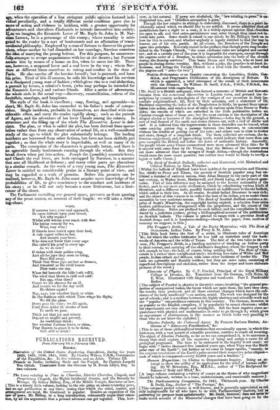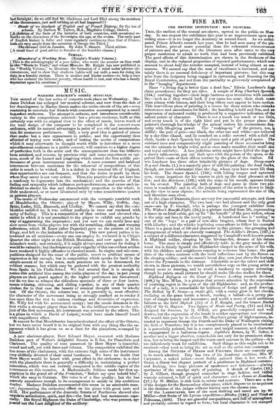PUBLICATIONS RECEIVED.
From February 7th to February 13Th.
Boons.
Narrative of the anited. Stales Exploring Expedition, during the years 1838, 1889, 1840, 1841, 1842. By Charles Wilkes, U.S.N., Commander
of the Expedition, &c. In five volumes, and an Atlas. Volume IIL Nave& in India; inch Snide and the Punjab. By Captain Leopold Von Orliob. Translated from the German by H. Evans lAeyd, Esq. In two volumes.
The Laws relatnny to Pews in Churches, District Churches, Chapels, and Proprietary C els, the' Rights incidental thereto, and the Remedy for Wrongs. By Sidney Billing, Esq., of the Middle Temple, Barrister-at-law. {This is a timely little voe,.lookig to the stir going on aboutremoving pews, and an apt publication at any time; seeing that whilst the mind, matter, and t are kgal, the treatment is popular. Besides an exposition of the biraantlanpew3 poise Mr. Mr. Baling, in a long introduction, vehemently nrgestheir reten, Lion, by all the arguments that a pressed advocate can get together. This, how- ever, is but natural. If pews are abolished, the " law relating to pews" is ex- tinguished too, and Othello's occupation 's gone." Though the law relative to sittings is elaborately discussed, there ie &point dal eidentally raised which we should like to see settled. It seems admitted that all parishioners have a right to a seat; it is a widely-spread opinion that churches are open to ail, and that extra-parishioners may enter though they must not in- trude into pews. Some doubt is raised in our minds by Mr. Billing's book as to how far this is correetrand whether anybody is legally entitled to find the way to heaven out of his own parish. At all events, the Benchers of the Temple act upon this principie. It is truly stated in the preface, that though pews ma " ,y be abo- lished in the Temple Church, the most exclusive rules are adopted and carried um; and at a oertain peat of the.year it is .mposeibleforstrangers, except through the expiates order of a Beneher, to obtain admission into the body of the church during the Sanday services." This -beats Deans and Chapters who at least let reeptiazdaring divine worship. But, without a joke, the practice is et least in- and brings the Temple Church to a level with the theatre, and what the players call order for two."]
Noeitia Britannion; or en Inquiry concerning the Localities, Habits, Con-
dition, and Progressive Civilization of the Aborigines of Britain. TO *doh is appended, a brief retrospect of the result of their intercourse with the Romans. By William D. Saull, F.S.A., F.G.S., .F.R.A.S., 8cc. Illustrated with engravings. [Mr. Sault is a .British antiquary, who formed a museum of British and Rommaio remains from the occasional discoveries in London town, and perused the de- seriptious by country archasologiets of the vestiges of our ancestors in their im- mediate neighbourhood; till, fired by their accounts, and a statement of Dr. Beckeand respecting the holes of the Troglodytes in Sicily, he passed from spmtt:. Intim into action, and made.a tour of -vents to various spots from /Dover to York- shire; tke results of which are embodied in the little publittation before us. Curious enough some of these are; but the most curious is the description of the alleged abodes or burrows of the aboriginal Britons,—holes dug in the ground, sort of WO formed of the earth and stones thrown out, with a reof of sticks and turf. It is inferred that the improvement in these domiciles Can be traced, when some aspiring genius dug a paesage between two barrows, to communicate without the trouble of getting out of his hole; and others rose in trove to timber and stone, though of a .roughish finish. The facts collected are curious, the in- ferences conjectural, and, if approaching truth, would indicate that more than one gems occupied the British soil before the dawn of authentic history. Assuredly, the people whose army-CI:reser enconntered were more advanced than this: for It is argued with spate force by Dr. Young, that the Britons of the burrows were not more advanced than the savages of South Africk—though the Man-aliase would seem the more exact parallel; but neither race would be likely to terrify legion or baffle Cusar.] The Book of Scottish Ballads; collected and illustrated, with Historical and Critical Notices, by Alex. Whitelaw. [Whilst the ballade of England have been indebted for preservation and illustres tion chiefly is Percy and Ritsen, the pursuit of Scottishpopular eong hart ex- hibited a number of eminent names, from Allan Bamsayin the early part of the last century, to Walter Scott, Motherwell, and David Laing, of the present gene- ration. Part of this difference may be assigned to the, keener nationality of the Scotch, part to our more early civilization, which by substituting various kieds of literature, and a different taste, possibly fostered an indifference to the old halkds, which ended in their loss. At all events, Scottish ballad literature is very rich; sod the abject of this volume is to collect the best of its riches, yet-to make them accessible to very moderate means. The Book of Scottish Ballads contains a re- print of Scott's Minstre,by, the copyright having expired, a selection from some modern publications by arrangement with the propnetors, and the cream of the older collections. Notes are prefixed to each belled; and the compilation is intro dueed by a judicious preface, giving a bibliographical account of the publications on Scottish ballads. The volume isprinted to range with a previous Book of Scottish Song; and it is handsomo.4.—though the paper, from motives of economy we suppose, is thin.] The Trapper's Bride, a Tale of the Rocky-Mountains; with The Rose qt 011ing1114111; Indian Tales. By Percy B. St. John. (This little book forms the first of a series, to illustrate tales of American ,fe for which the anther inthtmees he has laid up materials amid the back- woods of America and the wilds of Texas. The first of the two tales in the voo nme, The Trapper's Bride, is a bustlingg narrative of tracking an Indian party to their retreat, and carrying off the duet emu's daughter, whom the trapper is nob rich enough to buy; the lady, of coarse, being nothing loth. The Rose of Nis- cousin is a rather more complicated story; involving love-tales of White and Red people, Indian attack and defence, with some other incidents of border life. The tales are agreeably and fluently written; but they are mere tales, consisting of superficial descriptions and sketehes, rather than the deeper and more elaborate pictures of the noveL] Elements of Physics. By C. F. Peschel, Principal of the Royal Military. College at Dresden, &c. Translated from the German, with Notes, by E. Wise Illustrated with &Trams and wood-cuts. Part I. Ponderable Bodies.
[The subject of Peschel is physics in theetriet sense; involving "the general perties of unorganized bodies, the forces which net upon them, the laws they the results thus produced, and all those external changes which leave the su stance of the body unaffected "—as motion, sound. The work was designed for the use'of schools; and is a medium between the highly abstruse and scientific work and the "popular" compendiums eonnnon in this country. The German, htnvever, is as popular as the English compilers, if by popularity be meant clearness; whilst his experiments are very simple and intelligible. But the book requires some ac- quaintance with physics and mathematics in order to go through it; which gives an appearance of abstruseness, in like Manner as Greek looks very puzzling to those who do not know the alphabet.] Elective Polarity, the Universal Agent. By Frances Barbara Burton, Au- thoress of " Astronomy Familiarized," &e. [This is one of those philosophical treatises that occasionally appear, in which the sentences, with a vast parade of scientific precision, contrive to evade all meaning. The object of Elective Polarity, so far as we can comprehend it, is to announce a theory that shall explain all the mysteries of being and assign a cause for all geological progresses. The time to be embraced in the inquiry is not scant: lee 'n with " twelve -thousand five hundred years ago, when Vega was the North ,star of the Earth" • but farther on we come to larger epooha, "namely, la the conjoint revolutions of the Earth's poles around their respective polarellipeeti-s each of which is-compassed—every 25,868 years and a fraction."] Human Magnetism; its Claims to Dispassionate Inquiry. Being an at- tempt to show the utility of its _application for the relief of human suffer- ing. By W. brewnhatn, Esq., MR.S.L., rather of " The Reciprocal In- fluence of Body and Wind," &c. [A large volume containing a variety of essays on the theme of why magnetism" should he believed; written in a loose, undeterminate, and unscientific manner.] The Parliamentary Companion, for 1845. Thirteenth year. By Charing+
R. Dodd, Esq, Author of The Peerage," &c.
[This compact pocket volume is well known, and isgenerally appreciated as not only indispehsable for all who have to do with Parliamentary matters, bet' el !answering its propose meeteasisfattorily. Mr. Dodd, however, does not seem'" make much account of the Ministerial changes that have been going on for the last fortnight; fir We still find Mi. Gladstone and Lora Eliot among themembers of the Government, just aaif nothing .at all hati.bappened 1] - Heads of an Analysis of English and of French History; for the nse of schools. By Dawson W. Turner) M.A., Magdalen College, Oxford. LA skeleton of the facts of the histories of both countries with occasionid.re- marks on the characters of the Sovereigns, the age, or the events. Theearly part of English history is fuller and more regularly continuous than that of France; betharearary ample from the accession of George the Third.] The-Sesectsit Girl in _London. By John T. Sennett. Third edition. [A small tract of good advice to females of the humbler classes.]
SERIAL.
Afessoinrof a Working Mon. (Knight's. Weakly Volume.)
L This is the autobiography of a poor tailor, who wrote the number on that craft teetheo"Guide to Trade," and whose Memoirs Mr. Knight has now published in his. "Weekly Volume," to illustrate the formation of a mind under adverse cir- cumstances, and to show that studious habits will not unfitman for doing his
dairy; iris station: There is another and kinder motive—to help.a man who has endured the bitterest poverty, whose health is bad, and who has :family dependent-open-his exertions.]



























 Previous page
Previous page